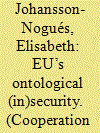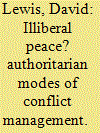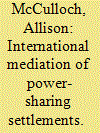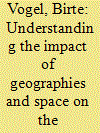|
|
|
Sort Order |
|
|
|
Items / Page
|
|
|
|
|
|
|
| Srl | Item |
| 1 |
ID:
162437


|
|
|
|
|
| Summary/Abstract |
The 2016 EU Global Strategy and the 2015 European Neighbourhood Policy (ENP) review have made stabilisation of the ENP area one of their main priorities. Our argument here, however, is that the Global Strategy and the ENP review not only seek to mitigate the numerous crises currently affecting the neighbourhood; they also aim to address a set of intra-EU vulnerabilities linked to events in the ENP area that are threatening the EU’s own ontological security. We employ narrative analysis to explore how insecurity in the EU and in the ENP area is affecting the EU’s relation to the neighbourhood-other and its understanding of the EU-self. Our main findings point to the Global Strategy and the ENP review providing ample measures to stabilise the neighbourhood. However, whether they have provided a sufficiently compelling narrative to enable the emergence of new emotional structures for the EU and its member states to make sense of themselves and their relation to the neighbourhood-other remains an open question.
|
|
|
|
|
|
|
|
|
|
|
|
|
|
|
|
| 2 |
ID:
162435


|
|
|
|
|
| Summary/Abstract |
In a contested international order, ideas of liberal peacebuilding are being supplanted by state-centric, authoritarian responses to internal armed conflicts. In this article we suggest that existing research has not yet sufficiently recognised this important shift in conflict management practice. Scholarship in peace and conflict studies has avoided hard cases of ‘illiberal peace’, or categorises them simply as military victories. Drawing on accounts of state responses to conflicts in Russia, Sri Lanka, China, Ethiopia, Rwanda and Turkey, we develop an alternative conceptual framework to understand authoritarian conflict management as a form of wartime and post-conflict order in its own right. Although violence is central to these orders, we argue that they are also dependent on a much wider range of authoritarian policy responses, which we categorise in three major domains: firstly, discourse (state propaganda, information control and knowledge production); secondly, spatial politics (both military and civilian modes of controlling and shaping spaces); and thirdly, political economy (the hierarchical distribution of resources to produce particular political outcomes). In conclusion, we propose a research agenda that moves on from discussions of liberal peace to examine hard cases of contemporary conflict and conflict management.
|
|
|
|
|
|
|
|
|
|
|
|
|
|
|
|
| 3 |
ID:
162434


|
|
|
|
|
| Summary/Abstract |
Power sharing is largely accepted among scholars and policy-makers as a potentially effective mechanism for building peace in the aftermath of violent ethnic conflicts and self-determination disputes. Although the operation of power sharing may be prone to ongoing challenges and even political crises arising from the legacy of the conflict, international actors continue to promote power-sharing arrangements to manage self-determination and other ethnopolitical conflicts. This article investigates the normative and instrumental reasons why third-party mediators (on behalf of international organizations and/or states) turn to power-sharing strategies during peace negotiations. It considers the reasons why third-party mediators promote power sharing when its maintenance is likely to depend on their ongoing commitment and governance involvement. We argue that mediators draw from four different perspectives in their support of power-sharing settlements: international law, regional and internal security, democracy and minority rights, and a technical approach where mediators focus on the mechanics of power-sharing designs. The article draws on in-depth semi-structured interviews with officials from the United Nations and the European Union working for the organizations’ respective mediation units as well as documentary analysis of official mediation documents.
|
|
|
|
|
|
|
|
|
|
|
|
|
|
|
|
| 4 |
ID:
162436


|
|
|
|
|
| Summary/Abstract |
This article argues that German–Israeli reconciliation after 1945 has not been as exemplary as is often suggested. Drawing on key aspects which emerge from a discussion of relevant concepts in the first part of the article – transitional justice and reconciliation – it will show that Germany’s memory culture, as evidenced in the elite discourse, has indeed developed in a way that points to a successful reconciliation between the two countries. On the other hand, however, German regret emerged only reluctantly, was by and large confined to West Germany, and took a long time to establish itself formally, with emphasis on German suffering rather than suffering caused by Germans always playing an important role in German collective memory after 1945. It will also show that at grass-roots level, reconciliation between Germany and Israel is far from unproblematic. Apart from providing a critical assessment of the reconciliation between Germany and Israel after 1945, the article contributes to current academic literature on transitional justice, reconciliation and the role of memory which suggests that even though commemoration and micro-level reconciliation might be important, the geopolitical context in which reconciliation takes place and strategic security considerations also play a significant role.
|
|
|
|
|
|
|
|
|
|
|
|
|
|
|
|
| 5 |
ID:
162432


|
|
|
|
|
| Summary/Abstract |
Current peace research has provided scholars with a range of conceptualizations of what peace is. Further, there is a substantial body of literature on the processes used to build peace – the how of peacebuilding. However, there is little research that examines the question of where peace and peacebuilding occur and how these spaces shape the possibilities of non-state actors to achieve their objectives. This article makes a theoretical and empirical contribution to the emerging debate by sketching out the concept of peace spaces and applying it to the United Nations’ controlled Buffer Zone in Cyprus, the geographical home of inter-communal peacebuilding. To determine how geographies impact on the possibilities of non-state peacebuilding actors, the article focuses on three elements, specifically, on how the physical space impacts on: (a) inclusion/exclusion of participants; (b) protection/control through elite actors; and (c) its influence on the discourses and solutions that can be imagined. The article finds that local and international actors alike make a clear connection between the physical space and political viewpoints, which has both enabling and restricting implications.
|
|
|
|
|
|
|
|
|
|
|
|
|
|
|
|
| 6 |
ID:
162433


|
|
|
|
|
| Summary/Abstract |
The Danish decision to enter US-led coalitions in Afghanistan and Iraq significantly consolidated and strengthened the Atlantic dimension in Danish foreign policy in the period 2001–2009. The period has attracted considerable academic interest, but there seems to be a lack of consensus about how to interpret the Danish decision, which has been characterised as everything from an indication of adaptation, to continuation of the Danish acquiescence to great powers, to path-breaking change in Danish foreign policy to an expression of small state independence. Part of the confusion in the literature is due to the lack of clear conceptual awareness regarding the concepts in use. This article identifies three frames in the literature and contributes to our understanding of the question of change and continuity in small state foreign and security policy by identifying the analytical implications of adopting a clearer understanding of analytical concepts such as adaptation, determinism, activism and internationalism in the Scandinavian context in general and the Danish context more specifically.
|
|
|
|
|
|
|
|
|
|
|
|
|
|
|
|
|
|
|
|
|